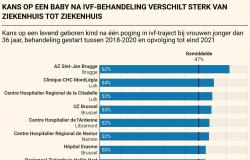The median energy bill for Belgian households increased by 4.4 percent in 2022 – more for half of the families, less for the other half. The impact of the energy crisis was therefore relatively minor, partly thanks to the generous support from the government.
Researchers Nicolas Soenen and Annelore Van Hecke of the Belfius research department have come to this conclusion. They examined the anonymized transactions of 260,000 households and 12,000 companies to determine how the energy bill developed. Their conclusions confirm what was already shown last year by economist Gert Peersman of Ghent University. He conducted a similar analysis based on anonymized transactions with BNP Paribas Fortis customers.
The Belfius analysis shows that the impact on families varied widely. About 10 percent of households saw their energy bills at least double. But a large part had lost just less than before the energy crisis.
After all, the government’s support measures were widely applied: every energy consumer could claim them, regardless of the actual additional costs. The lowest income categories benefited most from it, the Belfius figures show. The broader application of the social rate was only available to them.
Became more economical
The fact that the impact of the energy crisis was relatively minor is partly because a large proportion of families still had a permanent contract. They did not see their bill increase, but they did receive compensation. Another cause is that families themselves reduced their energy consumption.
In 2023, gas and electricity prices fell sharply. The government support measures disappeared, and the permanent contracts were forced to be replaced by variable ones. On balance, the median energy bill of households fell by 7.3 percent last year, Belfius notes.
The bank also looked at the companies’ energy bills. Depending on the sector, energy bills for companies increased by 35 to 57 percent in 2022. In 2023 there was a further increase of 2 to 16 percent.
The overall findings contrast with energy inflation figures. This averaged 71 percent in 2022 – much more than the actual additional expenditure. The mismatch arose because the inflation measurement only takes into account new contracts. The large number of families whose fixed, cheap contracts continued as usual are not taken into account in this measurement method. “As a result, Belgian inflation will be overestimated in 2022 and underestimated in 2023,” Belfius chief economist Véronique Goossens notes. “If there is a lesson to be learned from our study, it is mainly that the consumer price index should better reflect the actual development of life expectancy.”
Switch quickly
According to researcher Van Hecke, a different measuring method could be considered. The Dutch statistical service has changed its method in response to the energy crisis. This is more difficult in Belgium, because the prices of current energy contracts are not readily available.
The figures also show that many families received government support even though they did not actually need it. “The measures were taken in response to a crisis situation,” says researcher Soenen. “In those circumstances you have to act quickly, and you cannot always work in a very targeted manner. And don’t forget that one in ten families was faced with a doubling of their bill.”
Tags: households spent energy crisis year






